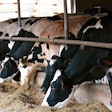
Citric acid is recommended frequently as a dietary supplement for non-ruminant animals, including fast-growing broilers. It has many effects, from being an antimicrobial agent, to enhancing palatability of feed, to improving phosphorus digestibility.
A recent study conducted in Switzerland and published in the Journal of Animal Physiology and Animal Nutrition looked at the effects of dietary citric acid on performance and mineral metabolism in broilers. A total of 1,720 chicks were randomly assigned to four groups for a rearing period of 35 days. The diets for the first four groups were supplemented with 0, 0.25, 0.75 and 1.25 percent citric acid, respectively. Feed and feces samples were collected weekly and analyzed for acid insoluble ash, calcium (Ca), phosphorus (P) and magnesium (Mg). The pH was measured in feed and feces. At the age of 28 days, 10 birds from each group were slaughtered; tibiae were collected from each bird for the determination of bone mineral density, total ash, Ca, P, Mg and bone-breaking strength, and blood was collected for the measurement of osteocalcin, Ca, P, Mg and 1,25(OH)2Vit-D in serum.
Birds that were fed citric acid-supplemented diets were heavier (average body weights of 2,030, 2,079 and 2,086 g in the 0.25, 0.75 and 1.25 percent citric acid groups, respectively, relative to the control birds (1,986 g). Weight gain per kg of feed intake was also higher in birds fed citric acid in their feeds (582, 595 and 587 g/kg feed intake for 0.25, 0.75 and 1.25 percent citric acid, respectively), relative to the control birds (565 g/kg feed intake). The digestibility of Ca, P and Mg increased in the citric acid-fed groups, verified by results of the analysis of the tibia.
At slaughter, the citric acid-supplemented birds had higher carcass weight and higher graded carcasses compared to negative control. The estimated profit margin was highest for birds fed the diet containing 0.25 percent citric acid. Although marginal benefits were received from further additions of citric acid, it appears that 0.25 to 0.75 percent citric acid is sufficient to enhance the digestibility of macro minerals, bone ash content, bone mineral density and bone strength, and to improve growth, feed efficiency and carcass traits. Perhaps, 0.5 percent citric acid is the optimum inclusion rate.















